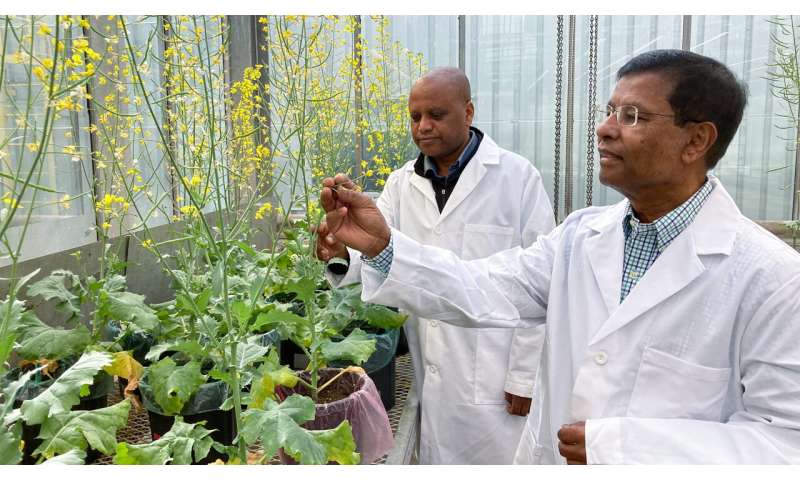New canola research aims to boost yield, profitability

New University of Alberta research is expanding the genetic diversity of canola, one of Canada's most important cash crops.
By sifting through the genes of broccoli, cauliflower, cabbage and kale, plant scientist Habibur Rahman and his team plan to pinpoint the best ones for breeding new lines of canola to produce hybrid cultivars with higher seed yield.
"This work is taking us to the next level of improved genetic diversity that will make hybrid canola stronger," says Rahman, a professor in the Faculty of Agricultural, Life & Environmental Sciences.
Production of the oilseed crop contributes $29.9 billion per year to the Canadian economy and is an important global export, totalling $14.4 billion a year. The crop is mainly grown in Alberta, Saskatchewan and Manitoba, and Canadian farmers harvest about 20 million tons of canola annually, with hybrid cultivars accounting for more than 95% of the crop grown in Canada.
Broccoli, cauliflower, cabbage and kale are varieties of a species known as Brassica oleracea. Determining which genes among them spur higher seed yield will help scientists fortify that crucial trait in hybrid canola.
The food-grade oil crushed from canola seeds is the crop's most valuable product, Rahman notes.
"Since oil is extracted from harvested seeds," he says, "if you harvest more seed, you will get more oil."
The in-depth work builds on Rahman's past research developing hundreds of canola lines. The experiments have proven Rahman's hypothesis that Brassica oleracea carries favorable genes for early flowering and for high oil content, traits that are also vital to successful canola cultivars.
His work has also proven that Brassica oleracea carries favorable genes for seed yield in canola lines and hybrids, but it's still unknown which specific genes influence this positive trait.
Working with Bayer Crop Science, Rahman and his team will develop new canola lines to create hundreds of hybrids. They'll then test them all in field trials across the Prairie provinces for seed yield, as well as other traits such as days to flowering and maturity, disease resistance and oil content.
Paired with other genetic and statistical analysis included in the scope of the project, the research will identify the genes or chromosome regions of Brassica oleracea contributing to high seed yield in canola.
"The findings can be used to increase the efficiency of breeding new hybrids," Rahman notes.
The resulting canola lines are expected to carry fewer undesirable traits such as late flowering that come with Brassica oleracea vegetables, and will produce better hybrids, Rahman says.
"By continuous breeding, we're trying to maintain the good genes in the new lines for higher yield and other positive traits."
Once it's developed and proven effective, the improved genetic material and the knowledge from the research will support the long-term work of Bayer Crop Science and other breeders to produce new commercial hybrids, he adds.
"It takes many years to develop superior hybrid canola cultivars, but the genetic research we are doing is important to maintaining the profitability of this crop at the farm level."
Provided by University of Alberta